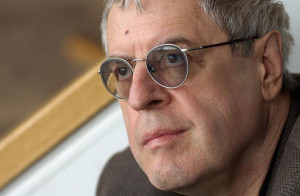Juggler of hats and live hand grenades. Tumbler, contortionist, impersonator, Living statue, wire walker, escape artist, Amateur ventriloquist and mind reader
Doing all that without being detected... —"One-man Circus"
Charles Simic conjures up this interior cast of characters from a lifetime of crafting poems.  These ten populate a single stanza near the end of his most recent book, “New and Selected Poems: 1962-2012.” They’re a scant handful of the roles he and his characters play in this 50-year compendium. The collection samples broadly from more than 13 of his 20-plus poetry volumes. Including memoirs and translations, Simic has published more than 60 books.
These ten populate a single stanza near the end of his most recent book, “New and Selected Poems: 1962-2012.” They’re a scant handful of the roles he and his characters play in this 50-year compendium. The collection samples broadly from more than 13 of his 20-plus poetry volumes. Including memoirs and translations, Simic has published more than 60 books.
Surveying his cast of thousands, everything and everyone gets a role —from “fate” to a flea. We readers can easily add a few dozen more shoes for Simic to fill or hats to don: insomniac and night wanderer, painter of pastorals with dada elements, relisher of sausage and onions, blind man’s dog lover and black cat walker, drowser and painter, pinner of medals and tailor of suits, the butchered and the butcherer, and teacher of now-gray-haired children (of which I am one).
Simic’s love of the imagists, surrealists, philosophers and underdogs permeates this half-century’s work. He’s a lifelong subscriber to William Carlos Williams’ doctrine: “No ideas but in things.” It’s an interesting prescription for a doctor, and Simic is a practicing metaphysician. Never have nouns been so alive, nor have so many memories been resurrected from the dead.
Simic casts poems with lickers of lollipops and ladies, a “king of birdshit,” swimmers and skinny-dippers, a sailing ship “pinned by one golden pin of sunlight.” A poet becomes as a momentary obstacle to a pond-bound toad. A dead flea who’s once bitten the ass of Abigail is now enfolded into the fallow pages of a used book.
As a reader, this journey takes a certain agility. Finding tests of transformation and reinvention, one trudges on as a dopey apostle of fate and futility. As a campaigner, we’ll witness two continents and four wars’ worth of human folly. Naturalist and transcendentalist guides bring us a talkative weed, crumb-snatching ants and a spider leaving little red footprints on our palms. To relish this volume enlists one as a devotee of a poet who sees as much with eyes closed as opened.
In his “Form and Theory of Poetry” classes at the University of New Hampshire, Simic recommended the benefits of reading an author’s work chronologically, volume by volume. Close reading over a creative continuum serves as an apprenticeship of sorts. It’s the way many of his students read Williams, Wallace Stevens, Sylvia Plath, or Robert Frost (just for starters…). “New and Selected Poems: 1962-2012” reads this way. Themes and concerns toss and turn as we philosophize along. We’re rewarded regular respites of rustling leaves and lakeside, a solitude of nappy dreaming. These interludes soothe recurrent troubled landscapes of war-torn Belgrade that set Simic’s family afloat in the 1940s. Simic was born and raised in an embattled place, an occupied territory and that also reverberates over this work. The great dictators were—his mom joked wryly—their tour guides and war an idiotic “orphan factory.”
Simic shared, in a 2004 interview with the Paris Review’s Mark Ford, “Naturally, I still have my obsessions, my bad habits, my blind spots. Like all poets who have written this long, I repeat myself.” More generously, I’d say there are major and minor variations on themes. Simic improvises and riffs, and reworks obsessive images. It’s enjoyable to see things revisited and reinterpreted after several decades.
It’s also interesting to see the short terse work in his early career give way to longer sectioned poems and then shrink again a few decades later. It offers a rewarding variety. His explorations in the long poem, “White,” published in 1972, gain nuance and complication when revisited in “The Invisible,” about 300 pages and 38 years later in 2010. These two poems are less conscious companions and more like inquisitive cousins across time and space.
Sand-smoothed ceramic doll-heads reward the wanderer at the water’s edge and their discovery punctuates several decades of beach-going. Keys—lost, rusty, singular, shiny, well-worn—fill the pockets and cigar boxes where we keep our collective personal histories. Signature early poems like “Knife,” “Fork,” and “Spoon” chronicled separately in the 1970s find themselves a trio in 2012. The spoon beside the bowl of the starved is counterposed years later by one licked clean of its honey.
If one knows the Simic canon, there are things to miss in “collected” work. The early and crystalline poems in “Charon’s Cosmology,” “Return to a Place Lit By a Glass of Milk,” “Classic Ballroom Dances” and “Austerities” aren’t differentiated in this edition’s timeline. These single collections blur now, but were full of quirky experiments and bold leaps. Poems kept company and were interesting neighbors.
Revisiting Simic’s prose poems, the Pulitzer-winning “The World Doesn’t End” is an unhappy reunion for which I blame not Simic, but his publisher’s typographical inexactitude. The poem’s original typesetting was episodic. Each poem, each page, had its own world and white space. Like the negative space around a three-dimensional art work, this white space was place to land, savor and reflect before moving to the next poem place. These poems struggle to hold their tautness in excerpted form. The prose poems appear in multiples upon a single page and therefore act, typographically, more like stanzas than chapters or episodes. As a reader, all the anticipatory joy of page-turning disperses. The dilution could easily be remedied using the volume’s nine blank pages at the end. But this is minor nay-saying.
A book of this scope needs a contextual forward and his peers and poetry co-conspirators would fall over themselves to write one, one can be assured. We could easily celebrate this accomplishment of 50 years endurance. But therein lies an interesting irony; without definers, Simic’s poems end up applying for the job.
Scrawly self-portraiture and poetic personas emerge in “New and Selected Poems: 1962-2012” every decade or so. Tongue-in-cheek self-definition ranges from a bestiary of his writing hand to “Charles Simic,” a poem that renders him as the double-entendred “sentence.” A little tangible self-scolding in one’s shaving mirror gets juxtaposed with our author proclaiming an intangible “secret identity” and escaping out the open window. Simic sees himself in the mirror of a city graffito: “crazy charlie” and follows up with poem “I’m Charles” in which he’s actually graffitied upon.
The collection’s poems of the last decade explore transitions. Simic retired after 35 years at UNH and the deaths of colleagues with whom he’d taught most his adult life. He served as U.S. Poet Laureate almost immediately thereupon. His children left the country for the city, and he’s become a grandparent. His poem “The Toad” revels more in the staying put than traveling:
"It'll be a while before my friends See me in the city…
I'm staying put in the country, Rising early, Listening to the birds Greet the light...
God never made a day as beautiful as today, A neighbor was saying. I sat in the shade after she left Mulling that one over, When a toad hopped out of the grass And, finding me harmless, Hopped over my foot on his way to the pond."
Optimistically, we could see another decade or decade and half’s poems added to this already impressive body of work. We’re lucky, as a nation, Simic found harbor in the U.S. and even luckier, as a state, to have him as a resident. His life in the New Hampshire countryside balances his city life as a youngster and makes him an interesting blend of barefoot metropolitan and sophisticated hayseed. He has many faces still yet to try on.
Generally, Charles Simic’s collections culminate with a hopeful gesture which is pleasing. In “New and Selected Poems: 1962-2012,” his new life is made manifest as a unnoticed ribbon of light under a door he’s not seen until recently. Although it’s the dream door of an insomniac, I feel relatively certain he’ll find the correct key tucked away in a pocket or in a dimestore cigar box.
— Rick Agran
Originally posted in The Wire
